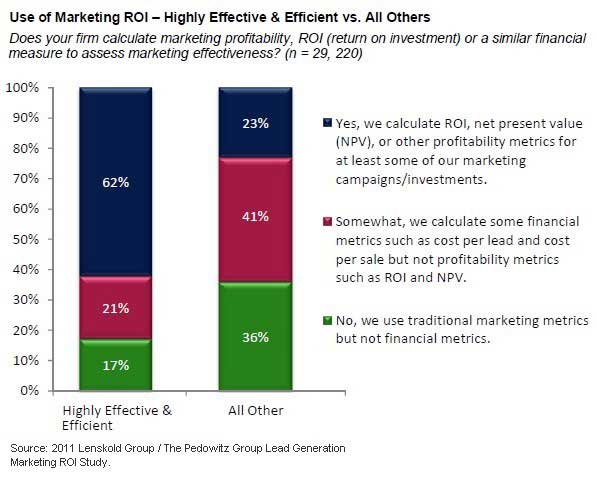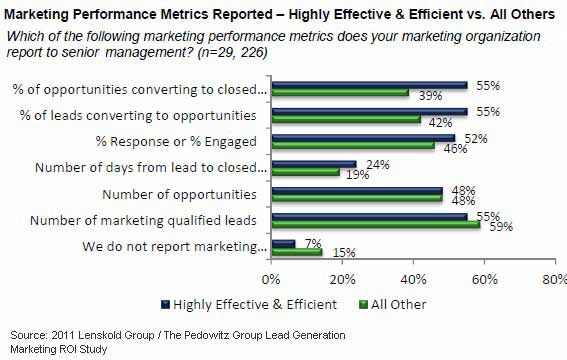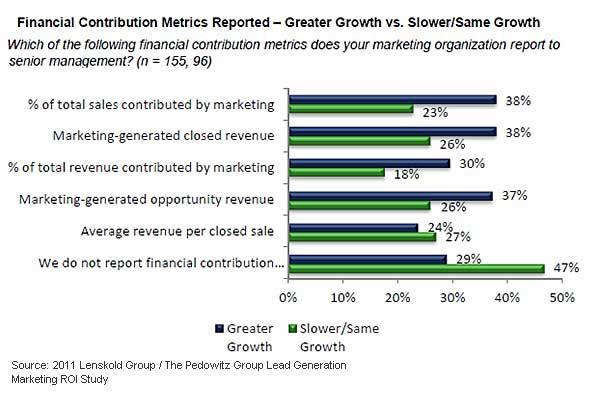B2B marketers who describe their organizations as "highly effective and efficient" are more likely than other marketers to measure the ROI of their marketing campaigns and report stronger growth than their competitors, according to a study by The Lenskold Group and The Pedowitz Group.
Among surveyed B2B marketers, an analysis of self-reported marketing capabilities revealed four levels of marketing competence:
- Highly effective and efficient: 11%
- Somewhat effective and efficient: 50%
- Somewhat effective but not efficient: 31%
- Not effective or efficient: 4%
Though relatively few in number (11% of B2B organizations), highly effective and efficient marketers tend to report stronger business growth: 55% say they are registering greater growth than their competitors, whereas only 13% of marketers who characterize themselves as less than highly effective and efficient say the same.
Below, additional findings from the 2011 B2B Lead Generation Marketing ROI Report, based on a survey of 263 of MarketingProfs' readers, conducted by Lenskold Group and sponsored by The Pedowitz Group.
In addition to the growth correlation, highly effective and efficient marketers are distinguished by a greater likelihood to measure the ROI of marketing investments and to report that information to senior management.
Tracking Marketing ROI
Highly effective and efficient marketers are nearly three times as likely to calculate ROI or other financial metrics to assess marketing effectiveness (62% vs. 23%).

Among other B2B marketers, most (41%) calculate financial metrics such as cost per lead and cost per sale (though not profitability metrics such as ROI and NPV), whereas 36% use traditional marketing metrics. Only 23% calculate ROI, NPV, or similar profitability metrics.
Reporting Performance Metrics on Marketing Programs
Among all B2B lead generation marketers, the performance metrics most often reported to senior management are the number of qualified leads (58%), the number of opportunities (48%), and the percentage of responses or engagement (47%).
Highly effective and efficient marketers, however, are more likely than other marketers to report lead-based metrics to senior management with the greatest differences among the following metrics:
- Percentage of opportunities converting to closed sales: 55% vs. 39%
- Percentage of leads converting to opportunities: 55% vs. 42%

Looking for great digital marketing data? MarketingProfs reviewed hundreds of research sources to create our most recent Digital Marketing Factbook (May 2010), a 296-page compilation of data and 254 charts, covering email marketing, social media, search engine marketing, e-commerce, and mobile marketing. Also check out The State of Social Media Marketing, a 240-page original research report from MarketingProfs.
Reporting Marketing Contribution to Management
Companies that report greater business growth than their competitors are more likely than those with the same or slower growth to report marketing's contribution to senior management:
- 38% of such greater-growth companies report percentage of total sales contributed by marketing, compared with just 23% of same/slower-growth companies.
- 30% of greater-growth companies report percentage of total revenue contributed by marketing, compared with 18% of same/slower growth.

Greater-growth companies are also more likely than same/slower-growth companies to report marketing-generated revenue to senior management (38% vs. 26%).
About the data: The 2011 Lead Generation Marketing ROI Study was conducted by Lenskold Group and sponsored by The Pedowitz Group, drawn from a sample of 263 respondents from B2B companies (more than one-half of their revenues generated from business customers) and whose marketing group generates leads for a sales organization or channel partners. Surveys were conducted via online survey with MarketingProfs' members as a module within the 2011 Lenskold Group Marketing ROI and Measurements Study, in June and July 2011.



